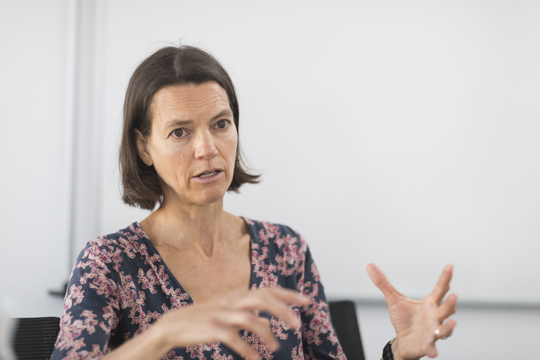Professionalizing the doctoral process
Freiburg, Jul 08, 2019
Doctoral researchers are often an unrecognized force in the universities. The German University Association of Advanced Graduate Training (GUAT) was founded in Freiburg ten years ago and has done a great deal for their profile and for the improvement of doctoral conditions. On 10 and 11 October 2019, the association’s tenth anniversary symposium will take place - you can register for it by 15 July here. Annette Hoffmann spoke to Dr. Silke Knaut, a member of the GUAT advisory council and director of the International Graduate Academy (IGA) at the University of Freiburg, who helped to found the organization.
 The team of the International Graduate Academy offers doctoral researchers and prospective doctoral candidates individual counselling. Photo: Jürgen Gocke
The team of the International Graduate Academy offers doctoral researchers and prospective doctoral candidates individual counselling. Photo: Jürgen Gocke
Ms. Knaut, some people get furious when they hear the term “junior researchers.” Can you see why?
Silke Knaut: Yes, of course. The classic terms for a supervisor really reveal the dependent situation that junior researchers are in. At the IGA and the University of Freiburg as a whole, we think it is important to call them “young researchers.” And by that we mean not just doctoral candidates, but also postdoctoral researchers.
What does the IGA do?
It is a pan-faculty institution and is responsible for all matters concerning doctoral studies. For example, it offers doctoral researchers and prospective doctoral candidates individual counselling and a program of universal professional skills. The IGA is also where the central mediation office for doctoral researchers and supervisors is located. The ombudspersons are there to help find a solution in all conflicts arising from the supervisory relationship and from the work on the doctoral thesis. The IGA is also co-responsible for the execution of quality assurance measures in the doctoral process - these have been strongly promoted in recent years by the state law governing higher education.
How did GUAT get started ten years ago?
The managing director of the IGA at the time, Professor Dr. Helmut Hoping, and his colleagues at other universities came up with the idea together. Germany had no association working for the interests of early-career researchers or which could provide a platform for the academic managers in the field to network and exchange ideas. I assisted with the administrative and legal process at the time.
You yourself have a doctorate. What motivated you?
There were several things that motivated me. I spent part of my year as an articled clerk at a university in Namibia. I really enjoyed working on one topic for a longer time. And when I was able to do a doctorate in the field of environmental criminal law, I found I had come full circle: One of the reasons I decided to study was that I wanted to do something for the environment. Then I did the classic research assistant job for a professor.
 Silke Knaut and her team is working out a road map to ensure quality supervision for doctoral researchers. Photo: Jürgen Gocke
Silke Knaut and her team is working out a road map to ensure quality supervision for doctoral researchers. Photo: Jürgen Gocke
Would you have appreciated the services the IGA provides?
Yes, I could have done with them, especially to network with other doctoral researchers. I went looking for other networks.
What distinguishes good supervision of doctoral candidates?
It has to be tailored to the individual and the situation. It’s very important that both parties talk to each other before committing to the supervisory relationship. People need to talk about their expectations of the supervisory relationship and the doctoral process phase; that includes funding and/or the private situation of the doctoral candidate. Real connections with the university are important too, as are introductions to academic independence and the scientific community. We also have services for supervisors. Especially when you are supervising your first doctoral researchers, it is important to consider your own role. For one and a half years we have been working on a road map for good supervision; it directs the supervisor to those aspects of the job.
Are those people who do a doctoral while working also relevant here?
Yes, our services are open to all University of Freiburg doctoral researchers, regardless of the type of doctorate or funding. With those external doctoral researchers, it’s important that they don’t lose the connection with the university. What can help here – along with regular formal meetings with the supervisor – is contact with other doctoral candidates and contact persons for general inquiries.
The tenth anniversary of GUAT is the perfect opportunity to take stock. You don’t just work within the academic area, but also out into society. What have you achieved?
The issues have become much more visible - even just via GUAT’s publications. The association has grown strongly in the past ten years and now has 72 members. Our range of services has also grown; there are qualification options for members, and more recently also the mentoring program AUFWiND. A central institution for all the faculties providing services for doctoral and postdoctoral researchers has now become standard at the universities. Another step forward has been the new doctoral candidate statistics under the higher education statistics law; this enables us to get to know our target group better and helps many doctoral researchers become involved in networks. Baden-Württemberg has taken on a pioneering role here. The universities host doctoral conventions, at which doctorate-relevant issues are debated. And in 2018 Baden-Württemberg introduced the status of doctoral candidates, so that they can elect voting members to the Senate and the Faculty council.
You’re celebrating ten years of GUAT on 10 and 11 October. The program sounds a bit like a working meeting.
The evening lecture on the anniversary is open to the public. The second day will be more work, because we will be talking about good supervision and what has been done over the past ten years: the measures which proved effective, what it takes to achieve more. And we want to provide perspectives on what universities can do to keep good early-career researchers.

